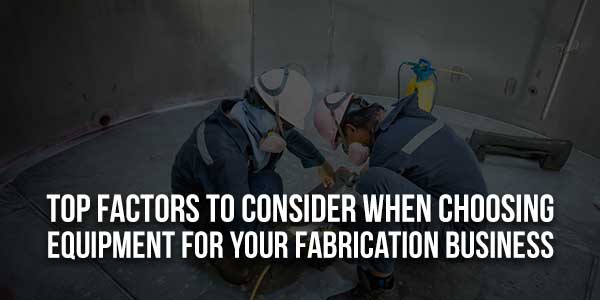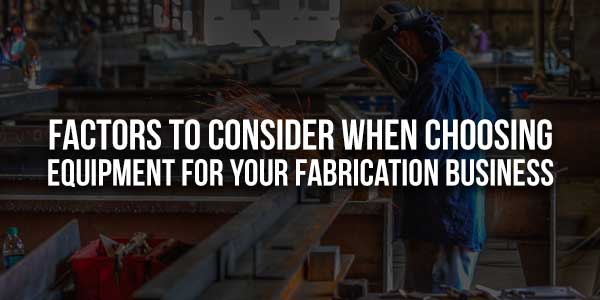
Starting or expanding a fabrication business is a significant investment, particularly when it comes to selecting the right equipment. The quality of your tools will directly impact your productivity, efficiency, and the quality of your work. Investing in the right equipment is not just about having the latest or most expensive tools; it is about selecting machinery that will meet your specific needs and help you achieve your business goals. So, here are six crucial factors to consider when choosing equipment for your fabrication business!
Table of Contents
Understanding Your Specific Needs:
Before you start shopping for equipment, it’s essential to understand your specific needs. Ask yourself these what types of materials will you be working with most frequently? Are there any particular projects or clients you need to cater to? Knowing the answers to these questions will help you narrow down the equipment that best suits your operation. For instance, if you often work on large-scale projects, equipment like heavy-duty welding machines and precision cutting tools are necessary.
Quality And Durability:
Investing in high-quality, durable equipment is crucial for a fabrication business. Low-quality tools not only compromise the quality of your work but also require frequent repairs and replacements, leading to increased downtime and costs. Look for equipment from reputable brands known for their reliability and performance. Reviews and recommendations from other welders and metalworkers can also provide valuable insights into the longevity and effectiveness of certain tools.
Versatility And Flexibility:
In the fabrication industry, versatility is key. Equipment that can perform multiple functions or adapt to various tasks can save you both time and money. For example, multi-process welders that can handle MIG, TIG, and stick welding offer great flexibility. Similarly, tank welding equipment designed for both flat and vertical welding positions can significantly enhance your operational capabilities.
Ease Of Use And Safety:
User-friendly equipment can dramatically improve your workflow and reduce the learning curve for your staff. Look for intuitive controls, clear displays, and ergonomic designs that make the equipment easy to operate. Additionally, safety is paramount in a fabrication business. Ensure that the equipment you choose has built-in safety features such as automatic shutoff, overload protection, and proper ventilation systems.
Cost And Financing Options:
While it’s tempting to go for the cheapest option available, it’s essential to balance cost with quality and functionality. Sometimes, investing a bit more upfront can save you money in the long run by reducing maintenance and improving efficiency. Explore financing options if the initial cost is a concern. Many suppliers offer lease-to-own programs, instalment plans, and other financing solutions that can make high-quality equipment more accessible.
Support And Warranty:
It’s also imperative to consider the level of support and warranty offered by the equipment manufacturer. A robust warranty can provide peace of mind and protect your investment, while good customer support can assist with troubleshooting, maintenance, and repairs. Look for manufacturers who offer comprehensive warranties and have a reputation for excellent customer service.

Energy Efficiency And Environmental Impact:
In today’s business landscape, energy efficiency is not only cost-effective but also an environmental imperative. When choosing equipment for your fabrication business, consider the energy consumption of each machine. Energy-efficient equipment can significantly reduce your utility bills and lower your carbon footprint. Look for machines certified by energy efficiency standards and those that incorporate eco-friendly technologies. Additionally, consider equipment that minimizes waste production, such as advanced cutting tools that reduce material scrap.
Training And Upgradation:
Another crucial factor to consider is the training required for operating new equipment and the possibility of future upgrades. Investing in advanced machinery may necessitate additional training for your team, which could involve time and extra costs. Ensure that the vendor provides comprehensive training programs and support to ease this transition. Furthermore, consider the scalability of the equipment.
Space And Installation Requirements:
Assessing the spatial and installation requirements of new equipment is essential to ensure a seamless integration into your existing setup. Large, industrial machines need ample space not only for installation but also for safe and efficient operation. Measure your available workshop space carefully and plan the layout accordingly. Additionally, consider the installation requirements such as power supply, ventilation, and any structural modifications that might be necessary. Prior planning will help in avoiding costly mistakes and will ensure that your new equipment fits perfectly into your operational workflow.
Choosing the right equipment for your fabrication business involves careful consideration of your specific needs, the quality and durability of the tools, their versatility, ease of use, cost, and the level of support provided by the manufacturer. By taking these factors into account, you can make informed decisions that will enhance your operational efficiency, ensure high-quality output, and ultimately contribute to the growth and success of your business. So, carefully evaluate your needs and vigorously research the best tools on the market today.

 About the Author:
About the Author:











Be the first to write a comment.